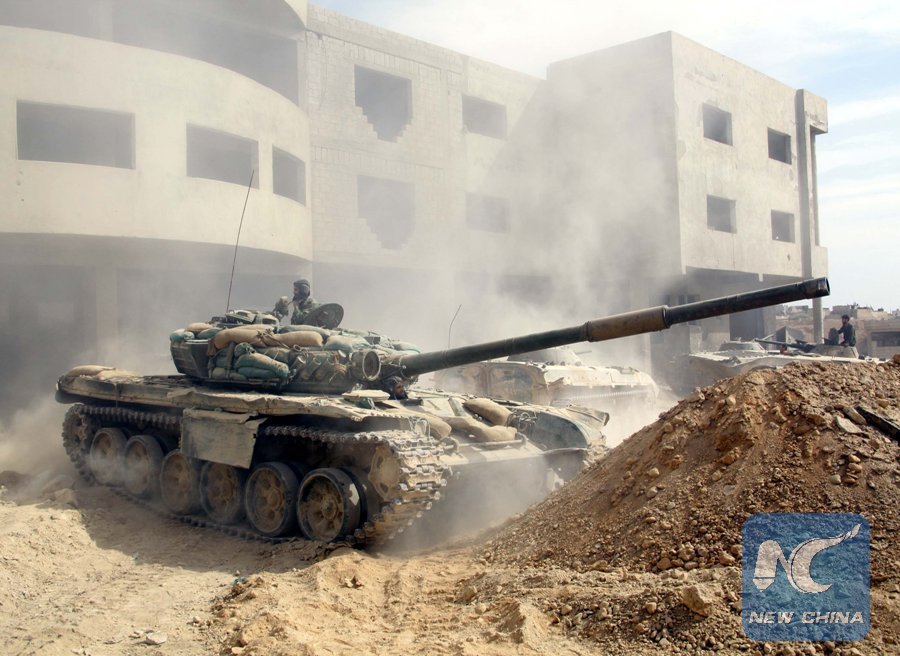
A Syrian tank fires at rebel positions in the Jobar area, east of Damascus, capital of Syria, on Oct. 21, 2016. The Syrian army foiled an attack by the armed rebels on the eastern rim of the capital Damascus on Friday, killing 14 of them, a military source told Xinhua. (Xinhua/Ammar)
UNITED NATIONS, Oct. 27 (Xinhua) -- Russia on Thursday described the latest report by the OPCW-UN Joint Investigative Mechanism (JIM) in Syria as "unconvincing," saying that the report is "not substantiated by sufficient testimonial basis "
Vitaly Churkin, the Russian permanent representative to the United Nations, made the statement at a closed meeting of the UN Security Council to consider the fourth report of the JIM.
"We can say already now that in most cases they are not substantiated by sufficient testimonial basis, first of all material proof, they are full of contradictions and therefore, unconvincing," Churkin said.
The OPCW-UN Joint Investigative Mechanism (JIM) in Syria was established after the United Nations Security Council in August 2015, unanimously adopted resolution 2235, aimed at identifying those behind chemical weapons attacks in Syria.
OPCW stands for the Organization for the Prohibition of Chemical Weapons (OPCW), an international organization based in The Hague.
"Our attitude to the conclusions of the third report including the fantastic case when the barrel landed vertically straight into a narrow hole is well-known," he said. "The JIM has added nothing new to this story, but for some reasons decided to readjust the initial conclusions on the incidents in Marea, Sarmin and Talmenes."
"As we understand the conclusions of the JIM are not definitive, have no legally binding force and cannot serve as accusatory conclusions for taking legal decisions," he said. "This has been unambiguously affirmed in paragraph 6 of the report."
"It is unclear why the JIM leadership clearly overstepped their mandate and tried in paragraph 52 to form an opinion in favor of holding accountable some individuals," he said.
"Damascus should carry out a comprehensive national investigation on chemical incidents confirmed by the JIM as provided for in Article VII of CWC," he said, referring to the Chemical Weapons Convention, an arms control treaty which outlaws the production, stockpiling, and use of chemical weapons and their precursors.
"We do not see any grounds for using the principle of exterritorial jurisdiction, against the provisions of the convention, to avoid the creation of a precedent, which is absolutely unacceptable to the prevailing majority of the OPCW member states," Churkin said.
The key factor that affected the quality of work of the JIM was "the lack of access to the sites of chemical incidents in the territory controlled by the opposition, which they have been denied" despite the requirements of relevant Security Council resolution, he said. "It was impossible to take sample and to store and process them in accordance with relevant standards."
Earlier this year, the Security Council voiced its concern about the use of chemical weapons by warring parties in Syria, including terrorists.
The JIM, established for a period of one year with a possibility of future extension, is tasked with identifying "individuals, entities, groups, or governments involved in the use of chemicals as weapons, including chlorine or any other toxic chemical" in Syria, according to the Security Council, which reiterated that those responsible must be held accountable.

